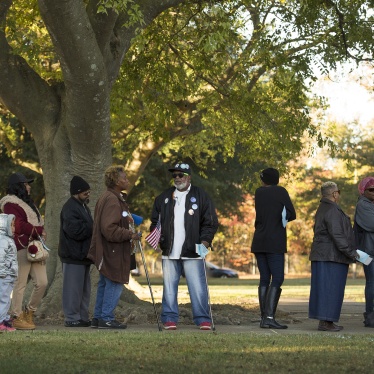- Thousands of people are being deported every year for drug offenses that in many cases no longer exist under state laws, harming and separating immigrant families.
- Punitive federal immigration laws separate families, destabilize communities, and terrorize non-citizens, all while overdose deaths have risen and drugs have become more potent and available.
- Congress should reform immigration law to give immigration judges discretion to make individualized decisions. States should ensure drug reforms apply to non-citizens as well.
(Washington, DC, July 15, 2024) – Thousands of people in the United States are being deported every year for drug offenses that in many cases no longer exist under state laws, harming and separating immigrant families, Human Rights Watch and the Drug Policy Alliance said today.
The 91-page report, “Disrupt and Vilify,” shows that the failure to reform disproportionately harsh federal immigration law has resulted in enormous numbers of deportations, splitting families apart, disrupting communities, and destabilizing people well-established in the US. For example, federal immigration law that treats some types of marijuana use as a deportable offense is at odds with many states’ recreational marijuana laws, penalizing immigrants and non-citizens for activities that are legal for citizens at the state level. The groups found that 500,000 people whose most serious offense was for drugs were deported between 2002 and 2020.
“The uniquely American combination of the drug war and deportation machine work hand in hand to target, exclude, and punish noncitizens for minor offenses—or in some states legal activity—such as marijuana possession,” said Maritza Perez Medina, director of federal affairs at the Drug Policy Alliance (DPA). “This report underscores that punitive federal drug laws separate families, destabilize communities, and terrorize non-citizens, all while overdose deaths have risen and drugs have become more potent and available. It’s imperative that the US government revises federal law to match current state-based drug policy reforms to end and prevent the immense human suffering being inflicted in the name of the drug war.”
Human Rights Watch and the Drug Policy Alliance interviewed 42 people affected by the deportations, including immigrants, families, and attorneys. The groups also analyzed new federal government data from 2002 to 2020 and found that 500,000 people have been deported whose most serious offense was drug-related. A previous Human Rights Watch report showed that from 2002 to 2012, 260,000 people were deported for drug-related offenses. This report updates that figure with an additional 240,000 people deported between 2013 and 2020, amounting to about one of every five deportations of immigrants with a criminal conviction during this period.
Overdose numbers have drastically increased, even as the US has engaged in massive numbers of deportations over this period, underscoring the ineffectiveness of such policies and of approaches that vilify immigrants in connection with drugs.
Convictions for even the most minor drug offenses—for example, possessing a small amount of a controlled substance, including marijuana—carry devastating consequences that far outstrip the criminal sentence imposed. The groups found that between 2002 and 2020, the federal government deported at least 156,000 people whose most serious criminal offense was for drug use or possession, including over 47,000 for marijuana use or possession, even though marijuana has been legalized or decriminalized in most states. Often, the offenses that lead to deportation are decades-old or so minor they resulted in little or no prison time. Some would not be criminal offenses if committed today.
“Why should parents or grandparents be deported away from children in their care for decades-old drug offenses, including offenses that would be legal today?” said Vicki Gaubeca, associate US director for immigration and border policy at Human Rights Watch. “If drug conduct is not a crime under state law, it should not make someone deportable.”
The report focuses on deportations from states with large immigrant populations that have advanced drug policy reforms, including California, Illinois, New York, and Texas, and includes cases of:
- Refugees and US military veterans separated from their homes and families due to deportations for drug offenses;
- Immigrants who have lived in the United States since childhood, but have been deported for drug offenses, sometimes for marijuana offenses that would be legal in their states today;
- Immigrant women who were sexually abused by corrections officers during their imprisonment for drug offenses, in part because their abusers knew they would soon be deported;
- Immigrants deported due to drug offenses to countries with dangerous human rights conditions, including one man returned to Haiti.
Many of those interviewed faced automatic deportation because immigration law defines their offenses as “drug trafficking aggravated felonies,” which bars them from almost all forms of immigration relief; these include several people whose convictions were for low-level offenses. In such cases, the judge is barred from considering individual factors, like evidence of US family ties, rehabilitation, military service, and other factors, and instead must order the immigrant deported. Some of those interviewed are legal permanent residents who have not been able to become citizens because they have engaged in drug conduct, including conduct that is legal in their states like working in the marijuana industry.
“I’m not able to live and operate without fear because I’m not a citizen,” said a lawful permanent resident in California, who was convicted for marijuana and paraphernalia possession. “I’ve lived here for more than 20 years now. This is my home. I have children here. I want to be a citizen, and I’m making every effort to do that. But it seems like that’s not going to be possible.”
There are significant racial disparities in the imposition of immigration penalties. Overall, the majority of people deported from the United States for criminal offenses are Black and Brown. Even within the category of non-citizens, Black immigrants are disproportionately impacted. More than one out of every five non-citizens facing deportation on criminal grounds before US immigration courts are Black. Black immigrants are more likely to be held in immigration detention longer and are less likely to be granted release.
As the overdose crisis and immigration reform increasingly become a central focus of political debates and campaigns, the Drug Policy Alliance and Human Rights Watch emphasize the need for elected officials to show leadership by heeding the research and embracing evidence-based policies grounded in public health, safety, and human rights.
“Deportation tears families apart, and the evidence is clear that despite the US deporting 2,400 people per month for a drug offense, overdose deaths have risen,” said Perez Medina. “Our lawmakers must ensure that drug policy reforms prioritize public health policies to address the overdose crisis and problematic drug use. The exclusion and vilification of our immigrant neighbors is inhumane and fails to solve the issues our communities care about.”
The US Congress should reform immigration law to ensure immigrants with criminal convictions, including for drug offenses, are not subject to “one-size-fits-all” deportations. Instead, immigration judges should be given the discretion to make individualized decisions. As an important first step, Congress should impose a statute of limitations on deportations, so people can move beyond old offenses and get on with their lives.
States, meanwhile, should ensure that reforms to reduce criminal penalties for drug offenses and facilitate treatment and health services for those struggling with substance use are designed to allow non-citizens to benefit as well.
“Current and past administrations have recognized the disproportionate impact of harshly punitive drug policies on Black and Brown communities,” Gaubeca said. “But through their immigration policies, Congress and the executive branch are perpetuating these harms and devastating many of these same communities.”







